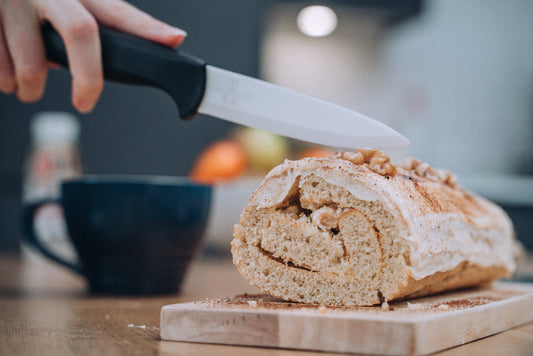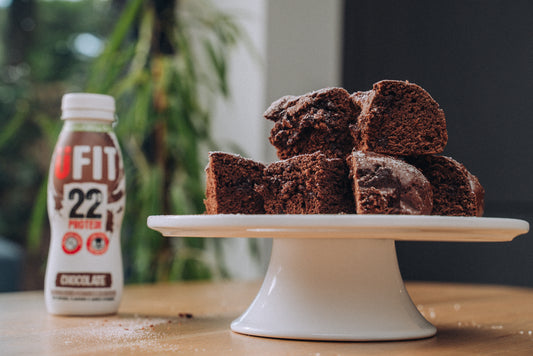For years, fad diets and heavily restrictive eating have dominated diet culture. Cambridge, Atkins, Keto, Paleo, Hamptons… the list goes on. There are so many conflicting diets, fitness regimes and quick fixes out there that people gravitate towards for a solution, but more often than not, just overcomplicate matters – especially in the race to get that perfect "summer bod."
Cut carbs, live on kale juice, do tonnes of cardio, don’t eat any sugar, and only eat low fat… the messaging is constantly changing.
This confusion alongside heavy restrictions, means most people find it impossible to maintain these diets. The more you tell yourself you cannot have something, the more you want it... right? This constant feeling of guilt, failure, and disappointment is why most fad diets do nothing to help long-term and sustainable fat loss, but do contribute to low self-esteem and a poor relationship with food... and we're not about that here!
Weight Loss vs. Fat Loss
First, it is important to understand that Weight Loss and Fat Loss are two different things as your overall weight, or body mass, will fluctuate daily… even hourly! Water weight, hormones and even your clothes will cause your mass to vary, which is why you should never define yourself or decide how you feel about your body by the number on the scale.
The human body is a complex machine and we’re constantly learning new things about it, but the one thing that most people can agree on is that understanding calories is essential to fat loss. We know it sounds like another fad, but we promise it isn’t!
So, what is a calorie?
Calories are a unit of energy. As we consume calories in our food and drink, our bodies use them to fuel our organs and bodily functions, repair and grow our cells as well as other things. Calories that are not burned throughout the day are stored in our bodies for later use, however, if we consistently consume more than we burn, this is where fat gain happens.
For fat loss to occur, you must burn more calories than you consume. This is called a Calorie Deficit. Experts* widely consider a healthy and sustainable deficit to be around 500 calories a day. This would equate to roughly a 1lb loss per week. A bigger deficit is not recommended without first speaking to a health professional. People who want to gain weight should eat in a calorie surplus.
How many calories do I burn?
You burn calories simply by existing, but the actual number of calories that you burn per day relies on several factors. Your genes, gender, height and weight, age, and how active you are all play a part. You can use a fitness tracker or an online TDEE (Total Daily Energy Expenditure) calculator to work out an average, although these are not 100% accurate and shouldn’t be relied upon entirely. Your calorie deficit will be unique to you and vary daily depending on your activity levels, but you can use these calculations as a starting block.
It’s suggested to try eating at those calories for around two weeks to test your results, then adjust accordingly.
We know what you’re thinking. Some people may seem to be able to eat whatever they want and never gain weight, but that’s just perception. Taller people, or people with more muscle, naturally burn more calories than others, as do those who have active jobs but regardless of your lifestyle, everyone loses fat through being in a calorie deficit.
Staying in a calorie deficit
Being aware of the calories in food is the first step. Drinks, table sauces… even things like cooking oil can have as many as 125 calories per tablespoon! We know... it's completely unfair (crying face emoji.)
Switching to low-calorie alternatives of your store cupboard staples is one of the easiest ways to stay in a deficit, as well as consuming more nutrient-dense, high-volume foods like leafy greens and lean meats to fill you up. This doesn't mean you can't enjoy your favourite treats though! We would always recommend making space in your calorie "budget" for your favourite foods because, hey! They make us happy! And indulging occasionally isn't going to ruin any progress you've made as long as you are within your calorie limit, but certain foods will keep you satiated better than others.
This is where things can get a little more complicated and confusing because calories can further be broken down into macronutrients. Carbohydrates, Fats, and Proteins are each used as energy in the body in different ways, but it's important to note that on their own, none of them cause significant weight gain more than the others... yes, we're talking about you, Carbs!
Monitoring macros isn’t necessary if all you’re looking to do is shed some pounds however it is useful to understand how macros work to help you sustain a deficit.
For instance, Carbohydrates provide an easily accessible energy source for your body, whilst protein helps build and maintain muscle as well as reduces hunger hormones. Protein also requires more energy to digest, so increasing your protein intake is ideal for those who are looking to shed fat and stay in a calorie deficit.
Don’t go too low
Whilst consuming fewer calories is essential for fat loss, it’s important to understand that we do actually need body fat to survive and if we are not consuming enough calories, our bodies will struggle to function. It is not recommended* for an adult to consume less than 1200 calories per day (for women) or 1500 (for men) without consulting a doctor.
It is also worth noting that weight loss plateaus, where you stop losing weight, are normal even in a calorie deficit. As you get leaner, your metabolism, or the number of calories you’re burning daily, will change, so it’s important to re-calculate your daily calorie allowance once you’ve lost some weight.
Some people do find monitoring this calorie “budget” closely stressful, but others find it liberating as there are no restrictions on the types of foods they can eat, but calorie tracking isn’t always easy. When reducing your calories or increasing your exercise, it is best to do this gradually because sudden changes can cause hunger cravings to take over. If you find yourself worrying excessively about calories, we recommend taking time to learn about portion sizes and prioritising your mental health - because taking care of yourself is essential!
Food is fuel, but it’s also to be enjoyed, and consuming your favourite snacks shouldn’t ever be something to feel “guilty” about… because there is no one food that will make you gain fat faster than another… regardless of what diet culture tells you!
*sources Mayo Clinic, Healthline, NHS Online



